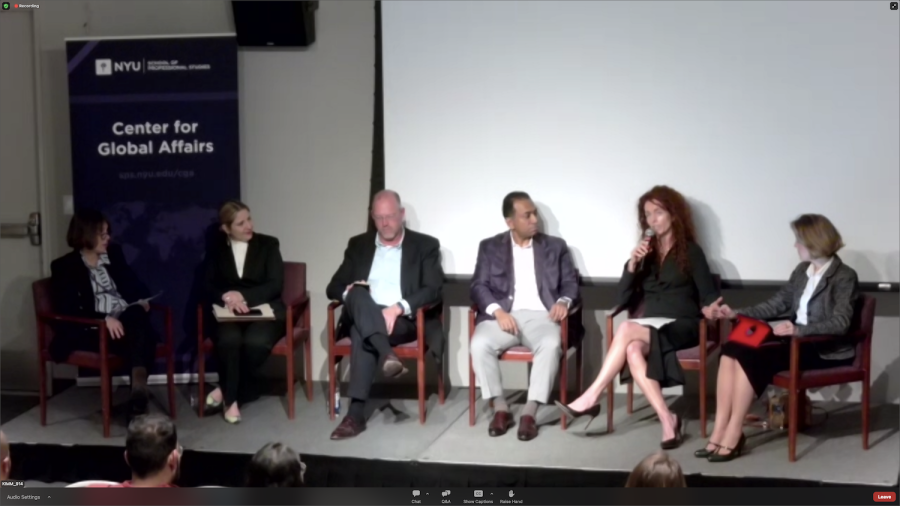One year later, how has the crisis in Ukraine affected global energy markets?
The Russian invasion of Ukraine began almost exactly one year ago. At NYU, a group of professors talked about the war and the effects it has had on Feb. 23.
The panelists from left to right: Amy Myers Jaffe, Tatiana Serafin, Bryan Martin, Vijay Vaitheeswaran, Carolyn Kissane and Chiara Lo Prete. (Courtesy of NYU SPS Center for Global Affairs)
February 27, 2023
One day before the one-year anniversary of Russia’s invasion of Ukraine, on Thursday, Feb. 23, NYU’s School of Professional Studies Center for Global Affairs hosted a six-person panel comprising NYU faculty and guest speakers, during which they discussed the radically shifting state of renewable energy in the region, and the United Nations’ resolution to push Russia out of Ukraine.
Panelist Tatiana Serafin, an assistant professor at Marymount Manhattan College and a senior fellow at the U.S. Global Engagement Initiative, discussed a resolution, voted for by 141 countries, which called for Russia to withdraw its troops from Ukraine. Serafin said that the resolution, which was adopted a few hours prior to the event, could help bring a quicker end to the war.
“Certainly Ukraine thinks it’s important because they feel that this narrative that the Global South does not support Ukraine, and that it is only a Western endeavor is debunked,” Serafin said.
Bryan Martin, managing director of D.E. Shaw & Co. and founder of DESRI who also sat on the panel, spoke about the state of the energy markets in the United States prior to the war in Ukraine. He also touched on how the war has increased the price of natural gas in the United States and resulted in a higher demand for renewable energy.
Martin also noted the historical similarities between the state of the energy market during World War II and the present day, with the ongoing crisis in Ukraine. He explained that lower U.S. natural gas export prices lead to fewer renewable energy plants, while higher prices lead to more renewable energy plants.
“Over the past year, much to our surprise, frankly, resolving Ukraine prices, changing liquified natural gas prices — that had an indirect impact in the U.S.,” Martin said. “We signed more power purchase agreements with utilities in the last year than we have in the last 20 years, and that’s because the natural gas prices went up so much.”
Vijay Vaitheeswaran, the global energy and climate innovation editor for The Economist and a panelist at the event, spoke about the ongoing and proposed changes in global energy markets, specifically in relation to carbon emissions and fossil fuels.
“If we don’t change our behavior or patterns of consumption through our lack of investments in energy efficiency, or adequate development of alternatives that are not fossil-based, then the future will look not so different from the past,” Vaitheeswaren said.
Serafin also recounted the dire circumstances under which the people of Ukraine continue to live and shared her concern for her loved ones, who she worries will experience a lack of food and resources.
“I have family in Ukraine and we wanted to get some money because we’re so worried that they can’t get food,” Serafin said. “I was able to send money via Western Union. I had to wait for a couple of hours, but isn’t that amazing? You’d think that this is a country at war but, in fact, we are also connected.”
Correction: A previous version of this article incorrectly stated that natural gas prices increased as a result of the Russian invasion of Ukraine. The article has been updated to reflect the correction. WSN regrets the error.
Contact Nikki Mirala at [email protected].





























































































































































